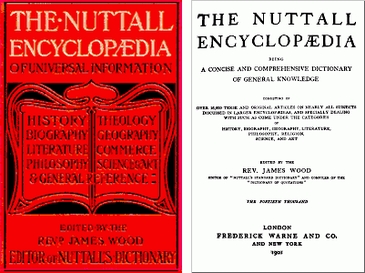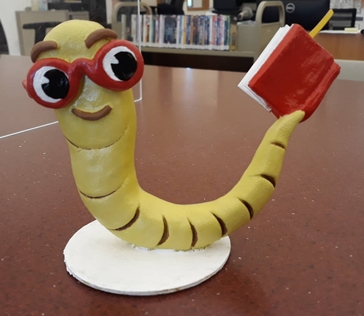The Checker Maven
The World's Most Widely Read Checkers and Draughts Publication
Bob Newell, Editor-in-Chief
Published every Saturday morning in Honolulu, Hawai`i
Noticing missing images? An explanation is here.
AI Didn't Cut It

We thought for today's column we'd try something new; namely, publish a checker problem composed by one of the better artificial intelligence (AI) engines. So we got on to one of them--- although we won't mention the name, it's by far the most well known--- and gave it a try.
It was a real learning experience.
We started out by asking it to compose a problem for 8x8 Anglo-American checkers. It happily did so, putting pieces on both the light and dark squares, and then offering to compose more difficult problems. We went through two more iterations and got the same sort of thing.
We then explicity told it to only put pieces on the dark squares (something it had previously told us it was doing, but it wasn't). Same result. We admonished it again. It came back with a problem and a solution that made no sense. For one thing the pieces were either (a) moving in the wrong direction, or (b) it was just fine to have an uncrowned man on the last row.
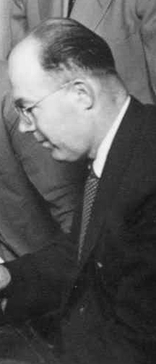
Tom Wiswell
After this we asked for sources of checker puzzles. It gave a few, with mixed accuracy; some of the websites cited didn't feature problems and the same was true of the referenced books. (It did give a pointer to our site, which was surprising but nice.) The engine also casually mentioned Tom Wiswell and offered to compose a Wiswell-style problem. Alas, that was a bust too, as again it confused movement directions and spewed out something that made no sense.

That was enough for us, and for today's column we turned back the clock to something well over a hundred years before AI and AI hype was ever even heard of, to select a nice problem by an honest to goodness human, who knew orders of magnitude more about composing checker problems than the best AI today seems to know.
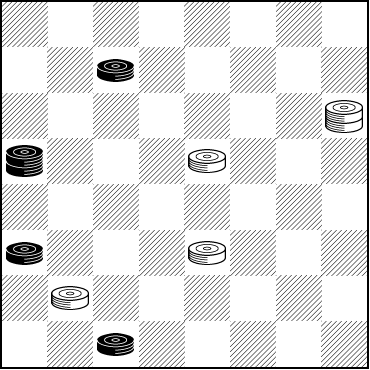
BLACK
Black to Play and Win
B:W8,10,18,K21:B3,12,K20,27
It's a nice problem, neither too hard nor too easy, which can be readily solved with your natural intelligence. Blow a raspberry at AI and solve this one, and then click on Read More to check your solution.![]()
The Encyclop(a)edia
So what's the correct spelling of "encylopedia"? (The younger amongst you might even ask "What's an encylopedia?" as they've just about gone the way of the dinosaurs.) The modern spelling is as just given--- encylopedia. But the older spelling is more like "encyclopaedia" although not exactly --- the 'a' and 'e' in the 'ae' combination are really a single character once called "ash" which represents the Latin 'ae' dipthong. A bit on the academic side? Perhaps, but interesting nonetheless.
The following checkerboard situation, also on the academic side, is derived from the famous opening guide called Kear's Encylopaedia, and we'll stick with the classier old style spelling as Kear himself did. It's on p. 370 and arises from a variation in a Souter opening. Black has just erred and now White has what is truly a textbook win. The problem is slanted more towards the advanced beginner or lower intermediate player, but our expert readers should see how quickly they can solve it.
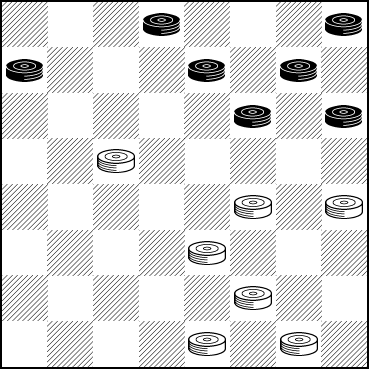
WHITE
White to Play and Win
W:W14,19,20,23,27,31,32:B2,4,5,7,8,11,12
It doesn't require encyclop(a)edic knowlege to solve this one, but it does require a grasp of some endgame basics. Give it a try and then click on Read More for the solution.![]()
Back to Work
It happens every January. The holiday season has come to an abrupt end, and it's back to work as usual for another year. Depressing? Perhaps. But don't let it get you down. We have a nice checker problem to help cheer you up and distract you from reality. It's from our nearly exhausted stock of problems by the late grandmaster composer Edgar Atkinson, who composed it at age 14 and had it published in Elam's Checker Board in December 1952, until the title Youthful Efforts.
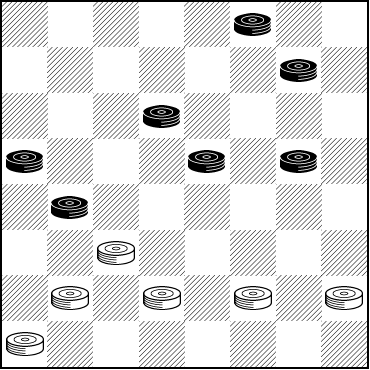
WHITE
White to Play and Draw
W:W22,25,26,27,28,29:B3,8,10,13,15,16,17
White is a man down; can you find the draw? It's not really that difficult ... or is it? Give it a try and then click on Read More to see the solution.![]()
Checker School: Memory and Concentration

Intense focus and concentration. You can't play championship checkers without it.
In today's Checker School installment we learn something that Mr. Andrew J. Banks thinks is important. Here's what he had to say in his unusual and entertaining book Checker Board Strategy as published some 80 years ago.
MEMORY --- CONCENTRATION
Concentration is the second method of developing a logical memory. As we walk down Pennsylvania Avenue, crowded with people and noisy traffic, or stop for a foamy, fizzy strawberry ice cream soda, we concentrate upon only about one one-hundreth of what is going on around us. In the same way, it is possible to run over a checker game and learn practically nothing. On the other hand, when the Internationalist showed Hatley how to solve a problem, Hatley's eyes popped open as he took in some startling maneuvre. He was alert; the new idea stood out on the horizon of this memory "like Mars at Perihelion." By concentration, we remember ideas rather than moves.
To illustrate his point, which we believe is that attentive problem solving yields more results than inattentive game replay, Mr. Banks gives us the following problem.
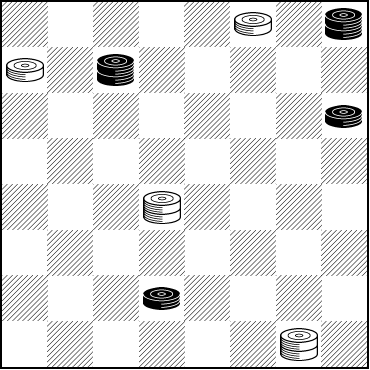
BLACK
Black to Play and Draw
B:WK1,K15,28,30:B7,21,K27,K29
It's quite a nice little problem, with two solutions, the shorter way (which Mr. Banks surely intended you to find) or the longer way. Go for the shorter way and see if you can find it, then concentrate your mouse on Read More to see the solution.![]()
It's A Trap!
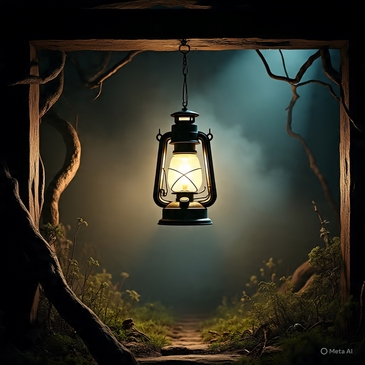
You're an adventurer about to enter strange and reputedly dangerous territory. Look ahead ... is it a trap? Is it safe to proceed?
Our game of checkers is no stranger to devious traps and the need for caution. Let's explore this a bit.
In our ongoing Checker School series, we've been (more or less) following along in the fascinating and eclectic book Checker Board Strategy by Andrew J. Banks, published back in the mid 1940s. One chapter in Mr. Banks' book is entitled "Denvir Strokes" featuring situations taken from the work of the controversal old-time player and writer John T. Denvir (no, it's not the more modern folk-singer who went by the pseudonym John Denver). Mr. Banks presents most of Denvir's problems as "traps" given the title of Denvir's 1894 book, Denvir's Traps and Shots.
Now, given Mr. Denvir's mixed reputation, we're not totally sure if the following is an original of his, but he does claim it was from one of his over the board games.
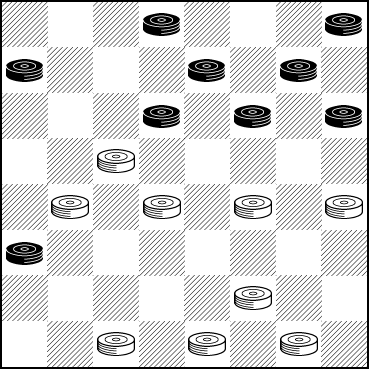
WHITE
White to Play and Win
W:W14,17,18,19,20,27,30,31,32:B2,4,5,7,8,10,11,12,21
It's actually quite a good problem, although perhaps not for the reasons you think. Why is this called a "trap"? You'll see when you solve it or click on Read More to see the solution.![]()
All Roads Lead to Rome
The old expression "all roads lead to Rome" stems from the long-ago empire of Rome once being the center of everything. Today, the saying generally means that there can be many ways to achieve the same goal.
We can apply this to our game of checkers, too. Here's a relatively easy speed problem that can be solved via multiple initial moves, but the play leads to the same result in all cases.

WHITE
White to Play and Win
W:W30,23,21,16,13,10:B19,9,6,3,1
Can you find the "roads to Rome"? We think you can, and when you have, click on Read More to check your solution.![]()
Look Harder

She's searching for something and obviously not finding it. She'll just have to look harder, and hopefully eventually will achieve success.
It's the same in our game of checkers. In some of the worst circumstances, when we think we're hopelessly lost, we need to look harder. Checkers is full of subtle resources and often enough there is some hidden feature in the position that will allow for a draw--- or even a win.
In the diagram below, we see that Black doesn't have much in the way of options, and while we can't expect a Black win, it's worth looking hard for a possible draw. This one isn't too difficult and falls close to being a speed problem, but nevertheless there's something rather clever to be found--- if you look for it.
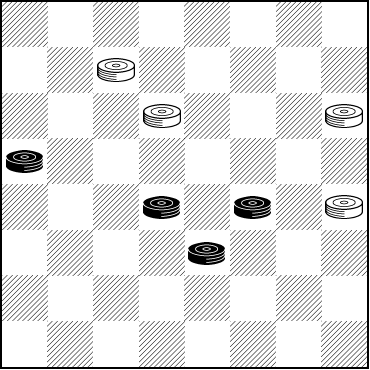
BLACK
Black to Play and Draw
B:W27,23,21,13:B20,15,14,10
Have a good hard look and then let your mouse find its way to Read More to see the solution.![]()
Labor Day Weekend 2025

Once again we're coming up on Labor Day, a great holiday that can trace its origins in the United States back over 140 years. Labor Day is celebrated in Canada at the same time, although many other countries opt instead for May 1.
Be that as it may, it's a day to honor workers of all stripes. You might be a business executive.

Or maybe you're a plumber.

Perhaps even a welder.

No matter. As we say every year, we feel that all honest work is worthy of respect and recognition. We don't think of any job as either lowly or elite; we're all just trying to get the job done in our own field and in our own way.
It's a three-day weekend and that might just allow a little extra time for checkers, amidst the parades, celebrations, BBQs, and everything else. So let's call on America's own Louis Ginsberg, one of the greats of the Golden Age of checkers. Here's a problem of his that we believe dates to the late 1920s.
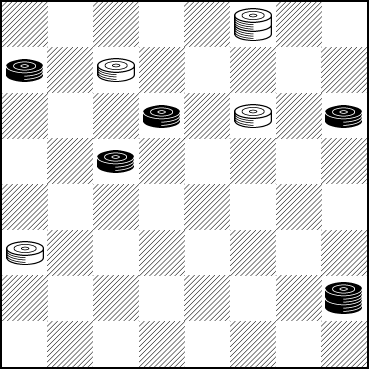
WHITE
White to Play and Draw
W:WK3,6,11,21:B5,10,12,14,K28
This one requires persistence and many "star" moves. Labor away at it, and then work your mouse over to Read More to show the solution.![]()
Memory Troubles: A Checker School Installment

In our ongoing Checker School series, we've been following along in Andrew J. Banks eclectic 1945 book Checker Board Strategy. Today we come to a set of articles on the topic of memorization. In our picture above, the protagonist is evidently trying to memorize a list of words. Of course today we know of many systems to aid in memorization, but the question of course is, what role does memorization play in our game of checkers? In Mr. Banks' first segment, he talks about repetition. Let's hear what he has to say.
"I am a bookworm," chuckled Hatley, "I will memorize everything." It was during his February vacation in Florida when he started to study "Lees' Guide." In his room and on the white sands of Daytona Beach, he memorized game after game, but when he returned to the Nation's Capital, he discovered that Stone did not play those games. Hatley soon forgot them; hence he was completely discouraged. What was his mistake?
He had violated the rule of repetition; he had tried to memorize too many games at one time. Natural--- but incorrect! He should have selected fewer games, then repeated them from memory not only on the first day, but on the second, third, fourth, seventh, and eleventh days also. To see what it was that he had forgotten, he should have tested his memory immediately, then again and again on later days until he could follow the sequence of cause and effect through each game and some of its variations. Remembering is aided by repetition and spacing periods of study.
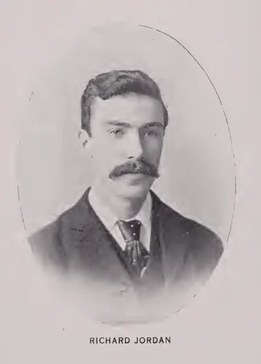
Public Domain
There is practically no limit to the amount that one can learn. Richard Jordan, for example, early in his meteoric career, defeated three famous world champions--- James Ferrie, Robert Stewart, and James Wyllie; and he himself became world champion in 1896. Moreover, in 1897, he again defeated Robert Stewart. Richard Jordan could play 20 games simultaneously at an exhibition while blindfolded; then he could repeat all of them from memory; and in addition he could remember those games backward. He apparently enjoyed recalling games that he had played.

Repeat and repeat from memory--- not from the book; then your memory troubles will not be so bad.

Public Domain
Certainly modern theory supports the idea of learning by repetition at spaced intervals, as famously championed by the SuperMemo system and many others; but Mr. Banks unfortunately doesn't address the main question. Should memorization be a part of checker study? Some say yes, some say no. Dr. Tinsley expressed the view that checkers is more about what you see than what you remember. Others say that memorization is a necessary part of preparation, especially with some 3-move ballots. What do you think?
Here's a problem from the selfsame book. Would any amount of prior memorization help you solve it? Perhaps that's an irrelevant question to ask about a "gem" problem, as Mr. Banks styles this one--- or is it?
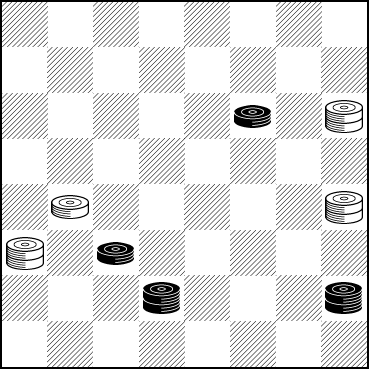
WHITE
White to Play and Win
W:WK12,17,K20,K21:B11,22,K26,K28
You decide. Solve the problem and then click on Read More to see the solution. And do write to us with your thoughts on memorization in checkers.![]()
Slippery Indeed

In one of the nightly contests between our regular contributors from Toronto, Lloyd and "Gosh Josh" Gordon, Lloyd remarked that "Josh slipped out."
We don't know if Gosh Josh can be said to be "slippery as an eel" but the following position, which is of "speed problem" difficulty (on the easier side relatively speaking), shows what he is capable of under pressure.
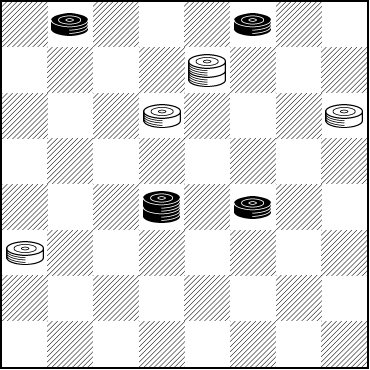
WHITE
White to Play and Draw
W:W21,12,10,K7:B19,3,1,K18
Are you as slippery as Josh? Can you help White slide out of this one and get a draw? Sure you can ... and we don't even need to grease the way with a hint. Do click on Read More to see the slick solution.![]()
The Checker Maven is produced at editorial offices in Honolulu, Hawai`i, as a completely non-commercial public service from which no income is obtained or sought. Original material is Copyright © 2004-2026 Avi Gobbler Publishing. Other material is public domain, AI generated, as attributed, or licensed under CC1, CC2, CC3 or CC4. Information presented on this site is offered as-is, at no cost, and bears no express or implied warranty as to accuracy or usability. You agree that you use such information entirely at your own risk. No liabilities of any kind under any legal theory whatsoever are accepted. The Checker Maven is dedicated to the memory of Mr. Bob Newell, Sr.
